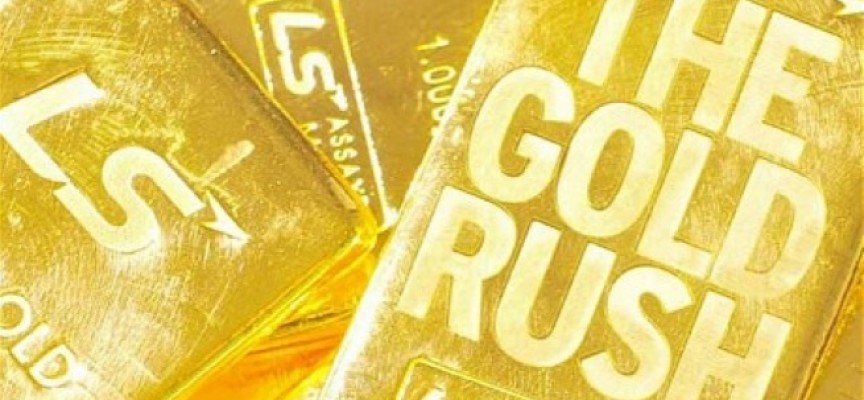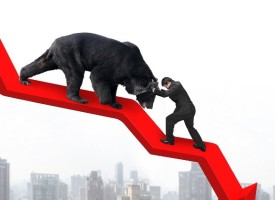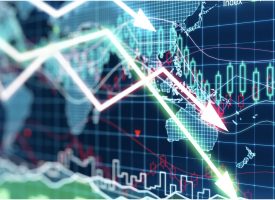With the price of oil tumbling and silver moving higher, the man who oversees more than $100 billion urges investors to buy gold and gold miners.
From CNBC: Jeff Gundlach, who oversees more than $100 billion at Los Angeles-based DoubleLine, “The yield on the 10-year yield may reverse and go lower again but I am not interested. You don’t make any money. The risk-reward is horrific,” Gundlach said. “There is no upside” in Treasury prices.

Gundlach reiterated that gold and gold miners are the best alternative to Treasurys and predicted gold prices will reach $1,400. U.S. gold on Friday settled up at $1,349 per ounce.
Gundlach lambasted Federal Reserve officials yet again for talking up rate hikes for this year while the latest GDP data showed disappointing economic growth. “The Fed is out to lunch. Does the Fed look at what’s going on in the economy? It is unbelievable,” he said.
Overall, Gundlach said the Bank of Japan’s decision on Friday to stick with its minus 0.1 percent benchmark rate — and refrain from deeper cuts — reflects the limitations of monetary policy. “You can’t save your economy by destroying your financial system,” he said.
Also, Peter Boockvar on what’s really happening around the world…
From Peter Boockvar at the Lindsey Group: JGB’s were hammered again overnight with the 10 yr yield rising 5.5 bps after the 8 bps jump on Friday. At a yield of -.135% it is the least negative since June 9th. As anyone buying this paper is of course not doing it because they want to lock in a guaranteed loss (except the BoJ) but instead are hoping for a capital gain by selling it to some other moron, someone is getting hurt and it likely is not just the BoJ. The biggest bond bubble of them all is in Japan but with many widows having been made over the past decade calling an end to it I’m not going to try today but this story is worth watching if the BoJ is truly at the end of the logistical QE road with JGB’s.
China’s state sector weighted manufacturing PMI essentially flat lined at 49.9 vs 50 in June and the estimate of 50. The private sector weighted index did as well at 50.6 but that was up 2 pts m/o/m and above the forecast of 48.8. Caixin/Markit said “the sub indexes of output, new orders and inventory all surged past the neutral 50 pt level that separates growth from decline. This indicates that the Chinese economy has begun to show signs of stabilizing due to the gradual implementation of proactive fiscal policy. But, the pressure on economic growth remains.” It’s so tough to know what economic activity is real and what is temporarily juiced by fiscal stimulus. With respect to services, the state sector PMI rose .2 pts to 53.9 which is the best level of the year. The market response to the data was mixed overall as the Shanghai comp fell .9% but the H share index spiked by 1.9%. The yuan rallied.
Manufacturing PMI in South Korea fell .4 pts to just above the breakeven at 50.1. Indonesia’s PMI fell back below 50 while Malaysia’s remained below 50. Taiwan rose .5 pt to just above 50 at 51. Japan’s final read stayed below 50 at 49.3. India’s was little changed at 51.8. Bottom line, all are about just treading water.
South Korea continues to feel the collateral damage from slowing growth in China and weak global trade as its exports fell 10.2% y/o/y in July, more than the estimate of down 6.7%. This is now negative for the 19th straight month as exports fell to China, the US, Japan, the EU and to Latin America. Imports fell by 14% vs the forecast of down 10.5%. The Kospi shrugged off the weakness by rallying about .7% after the China data seen. Interestingly the Won is at the best level vs the US dollar in 2 months as the Fed again is put into the background by mediocre US data.
Europe’s manufacturing PMI in July was revised to a hair better read of 52 vs the first print of 51.9 but remains down from 52.8 in June. Markit said that most of the growth is being seen in Germany only “while growth has almost stalled in both Italy and Spain and contractions are being seen in France and Greece.” European markets are mostly lower with the STOXX bank index down 2.3%, giving back the Friday rally as everyone digs thru the stress test results.
Not surprisingly it was in the UK where the real weakness was seen as its July PMI fell to 48.2 from 49.1 and vs the estimate of no change. Markit said “the pace of contraction was the fastest since early 2013 amid increasingly widespread reports that business activity has been adversely affected by the EU referendum…The downturn was felt across industry, with output scaled back across firms of all sizes and across the consumer, intermediate and investment goods sectors, although exporters did report a boost from the weaker pound.” The real question we’ll hopefully answer in coming months is whether the July data was a short term emotional worry and economic paralysis that will stabilize once the initial shock of leaving wears off.
The only thing I have to say about Bill Dudley’s comment overnight that “it is premature to rule out further monetary policy tightening this year” is quote my friend Peter Tchir who referred to the Fed last week as “the boy who cried rate hike.” ***To listen to the jaw-dropping audio interview with Michael Belkin, the man who advises the most prominent sovereign wealth funds, pension funds, hedge funds, and institutional funds in the world CLICK HERE OR ON THE IMAGE BELOW.
© 2016 by King World News®. All Rights Reserved. This material may not be published, broadcast, rewritten, or redistributed. However, linking directly to the articles is permitted and encouraged.








